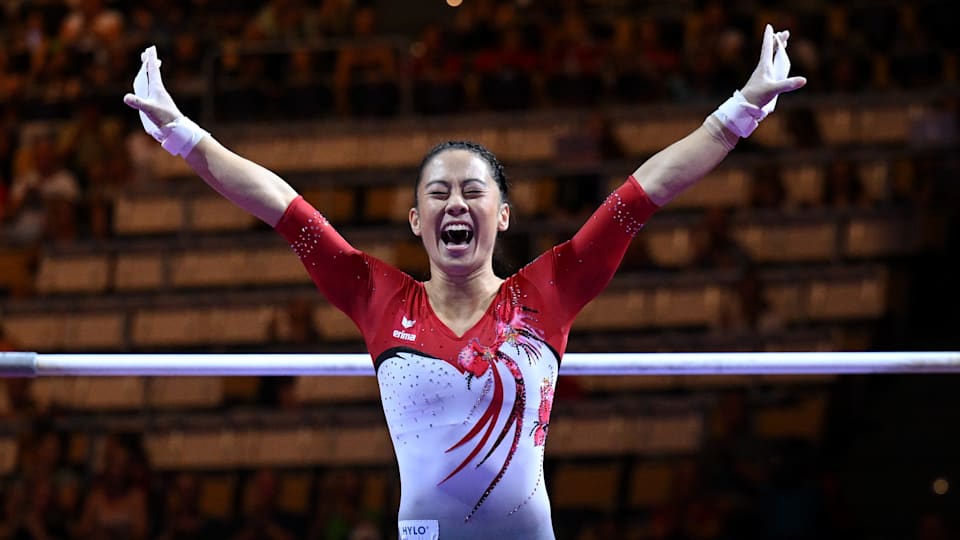Kim Bui on her battle with bulimia: "I want to say that you... are not alone"
The three-time Olympic gymnast opened up on her struggles with disordered eating in her recently release autobiography: “The hardest chapter to write was the one on eating disorders, I had never talked about it until then," she says.

Three-time Olympic gymnast Kim Bui of Germany is opening up about the darker side of her career in a new memoir released last month.
The 34-year-old, who retired in 2022 after helping her squad to a team bronze at the European Championships in Munich, says she struggled with disordered eating throughout her career.
“There are moments when I achieved top performance, beamed outwardly, but carried a dark secret with me,” Bui wrote in a post on Instagram. “For many, this is a taboo subject. Today I would like to speak openly about it and hope that this sensitive topic will be treated with respect! In the past, I suffered from an eating disorder - bulimia.
“I was athletic and thin, but not so suspicious,” she continued in the post. “I found the way years ago. But it took a long time for me, as a person affected, to be able to deal with it more openly. Too much shame, disgust and guilt plagued me. It's part of my story though, and I want to say that you who are affected by this are not alone.”
As body image has become front of mind in the sport in recent years, Germany’s female artistic gymnasts have often competed wearing unitards.
While part of that decision, many of the women have said, has to do with seeing unflattering pictures of themselves in leotards, Bui admits that having to spend her life in a leotard was a contributing factor for her.
“Gymnastics is a sport where aesthetics are important, you wear figure-hugging leotards, where every body proportion is emphasized,” wrote Bui, “and it is still often characterized by a child-like body shape.”
Kim Bui on stepping away: “It was a really hard to make this decision”
For years, Bui balanced high-level gymnastics training with high-level schooling including completing a master’s degree in biology.
“It took me much longer than my fellow students to complete the master’s degree,” Bui said, “but I’m very proud of myself for taking this master’s degree while doing gymnastics.”
Her decision to step away from the sport and begin a new professional life wasn’t easy, she says.
“It was really hard to make this decision, but I don’t regret it,” said Bui. “I’m still very happy with the decision and what happened at the European Championships in Munich was wonderful. In front of my home crowd, an amazing bronze medal with the team, a standing ovation from the crowd and so much appreciation for my performance.”
In addition to her three Olympic appearances, including a historic sixth-place finish as a team in 2016, Bui participated in six World Championships.
Kim Bui: A long time coming
Writing a book at age 34 wasn’t something Bui was thinking about.
But, in an interview with Gymnasticando.it, says she was first approached by an author about doing an interview following the Tokyo 2020 Olympics, which were held in the summer of 2021.
“At first, I didn’t quite understand what his goal was, but at some point, it became clear that he wanted to write a biography about me,” she said. “After a few calls, I met him in person. I was immediately skeptical that I could write a biography at such a young age, but he quickly convinced me that despite my young age, I had a lot to tell.
“In the spring of 2022, I met with him for several days to answer all the questions he had about my life,” Bui concluded.
As the process evolved, Bui decided to include a chapter about her eating disorder, something about which she had not previously spoken.
“The hardest chapter to write was the one on eating disorders,” she said. “I had never talked about it until then. However, before starting work with the author, I had the opportunity to meet a person who went through a period similar to mine. However, she had already overcome this moment and had managed to find the words to tell it. It was the first time I had ever told anyone about my eating disorder and it felt great.”
She knows gymnastics isn’t alone in having athletes suffer from disordered eating.
“It is a disease where the number of unreported cases is certainly much higher,” wrote Bui. “Other sports are also at risk for the development of an eating disorder, for example figure skating, rhythmic gymnastics, ski jumping or sports that involve weight classes. You often have a certain predisposition to an eating disorder and competitive sport with its demands fuels this.”
The German says she hopes that sharing her story will help others.
“Whether you are a competitive athlete or not, start talking about it and please get help, because this is such a big topic that you cannot solve it alone!”
